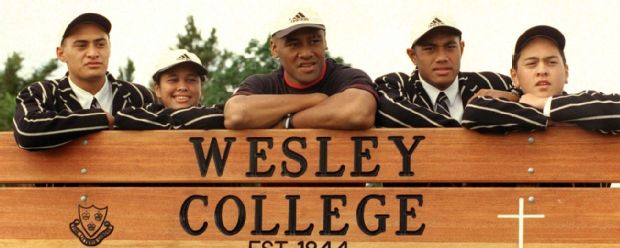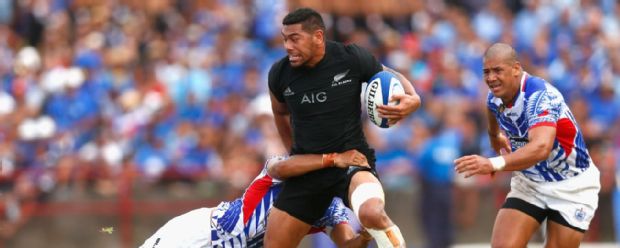|
New Zealand
Jonah Lomu - a humble hero who 'had time for everyone,' says Charles Piutau
Tom Hamilton
November 18, 2015
 Jonah Lomu carries the ball against England© Jamie McDonald/Getty Images On a wall at Wesley College secondary school in south Auckland are the results from its 1989 athletics championships. One name sits aside the list as the winner of the 100 metres, 100 metre hurdles, 200 metres, 400 metres, discus, shot put, javelin, long jump, high jump and triple jump: J. Lomu. For some great artists and composers, their work is only recognised once they are dead; their legacy established in their wake. For others, whether they are stars of the movie or sports worlds, the legacy of their peak periods is built over a career. Lomu's legacy, as the world comes to terms with the sudden death of an icon, was hammered home in six wonderful weeks in 1995 -- and then it grew. His influence on the game of rugby union cannot be measured merely by the 63 caps or 37 tries he amassed for the All Blacks. It spread to the rugby players of his era, but also those playing today and the next generation. Outside the game, Lomu touched people suffering from illness, everyone he met and continues to reach out through the two children and wife he left behind.  © Ross Setford/Getty Images At Wesley College, Lomu will always be the big name associated with whatever it does and linked to whoever passes through its doors in the years and centuries to come. The moving haka the class of 2015 performed on Wednesday was testament to that. Photos of the great All Black dominate the walls of the school; many of the children who have walked past them must have dared to dream. And Charles Piutau, now 24 and a 17-cap All Black, was one of those who stared at the images of his hero. "I was a different generation but he was the player I was whenever we played in the back yard. Having gone to the same school as he did -- Wesley College -- that was one of the reasons I was so excited to go there and to also play on the wing," Piutau told ESPN on Tuesday after learning of his hero's passing. "He was a legend of the school. "Every kid sees the photos of him around and his name on the honours board. Everyone there wants to have their name on the same honours board as he did. He's definitely someone I looked up to and still do. Jonah's haka was scary: Greenwood
%]"I last saw him on New Year's Eve near one of the parks in Auckland driving around in his family van which was black but had No.11 [his regular All Blacks shirt number] on the doors. He stopped to have a word with me and my family. He had time for everyone and wanted to learn more about you. That was my last memory of him." Piutau was only 4 when Lomu went rampaging through half of rugby's backs at the 1995 World Cup but still watches the highlights in awe of his ruthlessness. "I always think to myself 'how is that possible?'," he said. "Some of the things he did were freakish." Piutau's photo now sits on the same Wesley College walls as his hero Lomu and the current generation will be looking to follow in both of their footsteps. New Zealand youngsters today continue to try to emulate their heroes in back yards while those of sizeable frame and speed who make a dent on the wings are soon ascribed the moniker of being the 'next Jonah Lomu'. Piutau has felt the weight of that tag's responsibility on him on occasion but, like Julian Savea and others, has shot down the comparison. "I don't think there will be anyone ever who can replicate what he did on the world stage," was Piutau's take on the observations that are bound to continue.  © Phil Walter/Getty Images Savea's bulldozing of the French defence in the recent World Cup drew immediate comparisons to Lomu and a brief look at articles over the last few years found Nemani Nadolo, Taniela Tupou, Savea, George North, Taqele Naiyaravoro, Manu Vatuvei and even a new super-resource called 'ice gas' labelled the 'new Lomu'. When Lomu spoke to ESPN in August, he told of his unease at the readiness of people to liken new wingers to him. "I feel sorry for the players who I get compared to," he said. "They say there are similarities here and there. Someone like Savea is sometimes compared to me. There are big expectations put on them straight away and if they don't succeed, it is tough. I just want them to succeed and enjoy the game." Lomu changed the way we look at wingers and opened a new avenue for the way people perceived back play, and when he burst on to the scene it was an amateur game. His standing proved irresistible to broadcasters and he inadvertently fast-tracked professionalism. "It's fair to say that his bursting onto the international stage took the game to another level," New Zealand Rugby Union chief executive Steve Tew said on Wednesday. "It was probably an important spark for the game getting the opportunity to go fully professional because of what he did at the '95 World Cup certainly turned heads. Television channels certainly saw rugby as an opportunity to put some more very rich content on board after that World Cup." It also brought a welcome commercial boost to his All Blacks with their 1999 sponsorship deal. Tew added: "Our Adidas contract probably was initiated by [former Adidas head] Robert Louis-Dreyfus seeing him [Lomu] play in the World Cup."
Lomu recently revealed he was only in second gear for that obliteration of England as he was feeling the early effects of what turned out to be nephrotic syndrome. By 2002 he had played his final match for the All Blacks; the mind was willing but the body was letting him down. Two years on and he had a kidney transplant. For mere mortals that would have been a sign to slow down but Lomu was back in rugby a year later. He was an inspiration to those affected by debilitating diseases, and none more so than Joeli Vidiri, another former All Black who had to cope with the same chronic kidney disease. "I cannot hide my tears," Vidiri said of Lomu's passing. "We've had a lot of ups and downs in our lives and on the rugby field. Even during the times when we were most sick though, Jonah and I would always have a laugh." Kelleher lauds 'great brother' Lomu
%]Lomu said in August he wanted to live to the age of 55 so he could see his children turn 21 but Old Father Time is a cruel, unsympathetic beast. At least Brayley, 6, and Dhyreille, 5, spent the last few weeks with their father on his lengthy tour of the British isles as the World Cup panned out. "I'm taking my boys on a bit of a rugby adventure to see where it all began," Lomu said as he started his World Cup tour. "We have one boy who cheers for France -- he was born there -- and another who cheers for Ireland as my wife is part-Irish. Hopefully when they get older, that jersey will turn black. "Then there's Paddington Bear. I'm trying to tell them about the history of rugby and all we've heard since we got here is: 'When are we going to Paddington station?' But this is a time for me to show my boys what their dad used to do." They would have seen the adulation Lomu received from just about everyone who met him. His feats as a player have been immortalised in images, videos, anecdotes and glorious stud marks. The All Black giant's legacy will continue to grow and morph. The Wesley College rugby players for years to come will hear tales of Lomu and those battling illness and take inspiration from his refusal to allow his brutal disease to hinder his life. Lomu's legacy will live on through today's All Blacks and those to come. And then there will be his two boys, who will grow up to hear the stories of their father who changed a sport. "Rugby is a special, special game," Lomu said in August. "When my sons get older and play the game and they will turn around at one stage and say 'dad, what did you used to do in the game?'" "I'll say: 'do you see those guys getting the gold medals in the Commonwealth Games? Well dad helped to get the game into the Olympics. Dad played at a World Cup, won a Sevens World Cup and other titles. But the best of all? I made some great friends around the world." © ESPN Sports Media Ltd.
|
Live Sports
Communication error please reload the page.
-
Football
-
Cricket
-
Rugby
-
- Days
- Hrs
- Mins
- Secs
F1 - Abu Dhabi GP
Abu Dhabi Grand Prix December 11-131. Max Verstappen ()
2. Valtteri Bottas (Mercedes)
3. Lewis Hamilton (Mercedes)
4. Alexander Albon ()
5. Lando Norris ()
6. Carlos Sainz Jr ()
-
ESPNOtherLive >>
Boxing - Nelson v Wilson; Simmons v Dickinson; Joshua v Gavern (Metro Radio Arena, Newcastle)
Golf - Houston Open
Snooker - China Open
Tennis - Miami Open

